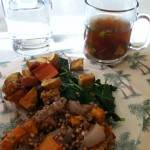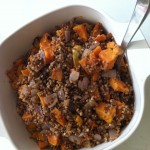 This has been one rough week. Much of CT is still without power due to the freak snowstorm that did more damage to our area than Hurricane Irene. My students in the Recipes and Strategies for Better Health class at Gilda’s Club will be looking for some nice warm food that will boost their mood.
This has been one rough week. Much of CT is still without power due to the freak snowstorm that did more damage to our area than Hurricane Irene. My students in the Recipes and Strategies for Better Health class at Gilda’s Club will be looking for some nice warm food that will boost their mood.
Here’s what we whipped up. A simple Miso soup, some steamed baby dino kale, roasted carrots, parsnips and onions, and some kasha with roasted sweet potatoes.
A gluten free, meat free meal loaded with nutrients and plenty of protein for under $3 a person. All with completely pronounceable ingredients!
Miso Soup with Shiitake
Shiitake stock lends an especially rich flavor to this hearty soup.
6 cups water
5 dried shiitake mushrooms
1 carrot, sliced
1 1/2 cups chopped greens (such as kale or mustard greens)
1 cup barley or brown rice miso
Soak shiitake in the 6 cups water overnight or for at least two hours. Remove shiitake, cut off and discard tough stems, thinly slice the caps, and place in a pot with the soaking water. Bring to a simmer, add sliced carrot, and cook for 5 to 10 minutes. Add greens and cook for 5 to 10 minutes more. Turn off heat. Dilute the miso in a little of the broth, then add to soup. Allow to steep briefly before serving.
Kasha with Roasted Veggies
Cut any or all of the following vegetables into small chunks:
Sweet potatoes, Parsnips, Carrots, Rutabagas, Turnips, Cauliflower, Onions, Shallots
Toss the cut veggies in some olive oil and salt. Place on a cookie sheet or roasting pan and put into a 400 degree oven.
Check every 10-15 minutes and turn them over a bit. They should be done within 20-30 minutes, depending on how they were cut.
While the veggies are roasting, dice 1 medium onion. Sauté onion in a small amount of coconut oil until golden
Add 1 cup buckwheat groats. Brown the groats lightly,
Add 2 cups veggie broth or another liquid. Sauté 10 minutes until broth is absorbed.
When root veggies are roasted, toss them into the kasha mixture and serve.
Here’s some additional info about buckwheat courtesy of Rebecca Wood’s New Encyclopedia of Whole Foods
Buckwheat is not a wheat or a cereal grain, but it is treated like a grain. In medieval Russia, the word kasha which today means roasted or cooked buckwheat, signified “meal” or “feast” because a meal was complete only with this staple present. Of all the grains, buckwheat has the longest transit time in the gut and therefore is the most filling and stabilizing for blood sugar. Since it is gluten free, many people with food allergies rely upon buckwheat. Buckwheat contains a high proportion of all 8 essential amino acids and 100% more calcium than other grains is rich in Vitamin E and contains almost the entire range of B-complex vitamins.



